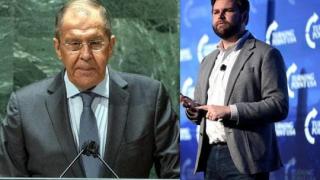Feb. 17, 2025 (EIRNS)—The future may not be determined, but it is definitive that we are at the end of the post-Cold War, so-called “rules-based order.” In the forefront of many manifestations, including the tears of the outgoing chairman of the Munich Security Council yesterday, is the meeting Tuesday, Feb. 18, in Riyadh of the U.S. Secretary of State and Russian Foreign Minister to re-establish regular relations between these powers and to confer on ending the warfare in Ukraine. These talks follow on the phone call Feb. 12 between President Trump and President Putin. In Riyadh, Foreign Minister Sergey Lavrov heads the Russian delegation, including Putin’s foreign policy adviser Yuri Ushakov. U.S. Secretary of State Marco Rubio heads the U.S. delegation, including National Security Advisor Mike Waltz and Middle East Envoy Steve Witkoff. The discussions will focus “primarily on restoring the entire complex of Russian-American relations. It will also be devoted to the preparation of possible negotiations on the Ukrainian settlement and the organization of a meeting between the two Presidents,” said Kremlin spokesman Dmitry Peskov today.
Ukraine and European nations are not involved in this Riyadh meeting, much to their expressed displeasure. Leaders of a select number of them, along with NATO Secretary General Mark Rutte, met in an emergency session on Ukraine in Paris today, called yesterday by French President Emmanuel Macron.
Lavrov said of this question of meeting with the United States without Europe, before taking off for Saudi Arabia today, “I don’t know what they [European officials] would do at the negotiating table … if they are going to sit at the negotiating table with the aim of continuing war, then why invite them there?”
There are also notable moves in Southwest Asia and Northern Africa. The Arab League yesterday announced they are expanding the nations participating in their meeting in Cairo to confer for reconstruction in Gaza, and to oppose the Trump “Riviera” plan to expel Palestinians. The meeting date has been moved forward from Feb. 27 to early March, in order to accommodate the new participants, which include, for example, adding the six nations of the Gulf Cooperation Council to the roster of participants. Egypt plans to issue in the coming days, its overview plan for infrastructure building and other work in Gaza.
Before this Cairo regional conference, Saudi Arabia is hosting a meeting on Friday, Feb. 21 (changed from Feb. 20) to confer on the same topic, among a smaller group of nations.
Meantime, there are moves to keep the Gaza ceasefire phase 1 in effect, and prepare for phase 2. An Israeli delegation was reported to go to Cairo today, to confer on continuing phase 1, and preparations for phase 2. This came after a phone call over the weekend from U.S. Middle East envoy Steve Witkoff to Israeli Prime Minister Netanyahu, and Witkoff’s account of the call on Fox News “Sunday Morning Futures,” which appears to have blindsided Netanyahu into some kind of compliance.
At the center of all this rush diplomacy, with the critical re-establishment of U.S.-Russia relations, is the question of content of dialogue and concepts for economic development now and for the future.
Schiller Institute leader Helga Zepp-LaRouche reiterated today that there can be no cure for the problems and crises without putting in a new security and mutual-benefit architecture, and that cannot be done without getting rid of geopolitics. The Oasis Plan, put forward decades ago by Lyndon LaRouche, embodies that perspective.
Zepp-LaRouche referred people to the Feb. 14 International Peace Coalition discussion as a “breakthrough” dialogue on this. Dr. Naledi Pandor, former Minister of International Affairs and Cooperation, spoke of the Oasis Plan as offering the opportunity for a new way of thinking about the world. In the course of the discussion Dr. Pandor raised, for example, the perspective of the African Union “Agenda 2063,” as in line with the principles of the Oasis Plan, for the continent of Africa. Pandor was instrumental in the initiation of Agenda 2063 for the African Union centennial for the continent. The 50-year development perspective officially started in January 2015, known as “The Africa We Want in 2063.” The plan has multiple tracks of goals, including agriculture, industry, transportation, and so on.
The same day as Dr. Pandor spoke at the IPC, the African Union convened its two-day annual Summit in Addis Ababa, attended by more than 50 nations. This is where progress is reviewed for one or another goal of the AU Agenda 2063 over the past year. Last year was important diplomatically for the African Union to take its place in the strengthening of the Global Majority, as the African Union joined the Group of 20. South Africa is president of the G20 for 2025, and will host its First Ministerial Meeting of the G20 on Feb. 20-21 in Johannesburg, at which the development of all Africa is likely on the agenda. U.S. Secretary of State Marco Rubio has insultingly announced he will not attend, which is in line with the rupture the incoming Trump Administration caused with South Africa in recent days. The U.S. will do well to expeditiously reconsider this, as well as its stance on Gaza.
In this regard, Zepp-LaRouche restated a fundamental point today. The crisis we face is not just military, strategic, and financial in nature, but it is a cultural and moral breakdown. The function of good government is to unleash the creativity of people for the joy and productivity for providing for the common good. Think of the Oasis Plan approach in that way.






